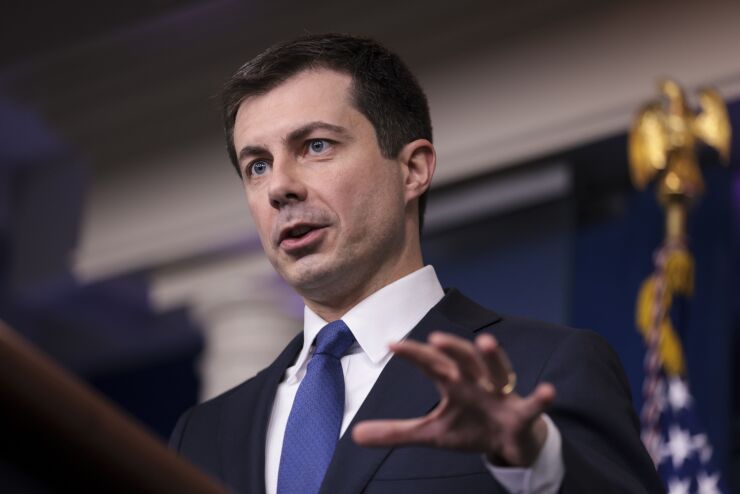As high-speed rail project sponsors across the country compete for federal infrastructure funds, Republican lawmakers Wednesday urged U.S. transportation chief Pete Buttigieg to reject California's request for its long-struggling project.
"We should work together, you and I, to conduct a full audit of the project before any high-speed grant decisions are made," Rep. Troy Nehls, R-Texas, told Buttigieg Wednesday during a House Transportation and Infrastructure Committee hearing.
The project "gives high-speed rail a bad look," Nehls said. "It's just costing billions of dollars and they're going to come to your office and they're going to request more."

Every proposed high-speed rail project in the country, from Texas, Nevada and the Pacific Northwest, was touted during the six-hour oversight hearing on the U.S. Department of Transportation's policies and programs.
The transportation chief declined to comment about specific projects, noting they're in the midst of applying for federal funds, but said the Infrastructure Investment and Jobs Act moves the nation closer to the technology that has proved so popular in other countries.
"We won't be able to have a fully built-out national rail network with just the five-year authorization of the IIJA but it gives us the best start we've ever had," Buttigieg said. "For many Americans, seeing would be believing, and experiencing that value being created on American soil would create that much more appetite to further develop a genuine national high-speed rail in the future."
The IIJA provides money for high-speed rail primarily through the Federal-State Partnership for Intercity Passenger Rail program, which provides $36 billion in advance appropriations through 2026. The competitive grants can be used to upgrade existing rail systems and establish new ones, including privately run lines. The smaller Corridor Identification and Development program also offers money for planning and development of intercity rail services.
The California bullet train is one of a handful of fledgling high-speed train projects in the U.S., and the only one that is publicly-owned. Its price tag in recent years has climbed to $128 billion for the full 500-mile line, which promises a ride time of less than three hours between San Francisco and Los Angeles.
The state is
"This is billions of dollars of taxpayers' money," Nehls said. "I support high-speed rail in America, I just don't support this project."
Nehls and Rep. John Duarte, R-Calif., encouraged Buttigieg to open an investigation into the project, and Duarte added that the department should also measure the amount of carbon the project is emitting during the construction phase.
"This, Mr. Secretary, is a useless project," Duarte said.
Further east, Rep. Dina Titus, D-Nev., told Buttigieg that a proposed Brightline West bullet train planned between California and Nevada is "real competitive" and that officials "have been working on it for a long time."
Brightline, which is owned by Fortress Investment Group, has applied for a $3.75 billion federal-state interstate rail grant, which, if awarded, would cover roughly 30% of the $12 billion project.
The train service would "not only spur business commerce trade open up ports from southern California into the interior as well as tourism, in both directions," Titus said.
Buttigieg agreed the project enjoys a "unique combination of advancements ... on both the permitting and the right-of-way for the project this calendar year" and benefits from a design that runs the train along Interstate 15.
"I think a lot of people who envision high-speed rail where they live wish there was such a ready right-of-way to take advantage of," Buttigieg said. "So that is certainly a project that I know I can tell you has our attention."
Washington state Democratic Rep. Maryland Strickland touted the
The Washington Department of Transportation has submitted a grant to the Federal Railroad Administration to advance the project, she said.
"When we talk about high-speed rail, the Pacific Northwest often gets overlooked in this conversation, so we want to make sure you're aware that we're out there and we need your support," Strickland said.
Texas Democratic Rep. Colin Allred touted a
The Lone Star State is poised to grow by nearly 50% by 2045, Allred said. "We have to provide more options for getting around," he said. "The time for investments in these kinds of projects is now," he said. "How can we ensure sufficient levels of funding?"
Buttigieg responded that the IIJA provided "the means to introduce high-speed rail or accelerate it" but "did not contain enough funding for a full national high-speed network.
"But I believe there are the means within the IIJA to fund more than one high-speed rail project in the five-year life of this bill, and the success of those projects will be an important part of how future investments in those kinds of projects are justified," Buttigieg said.





